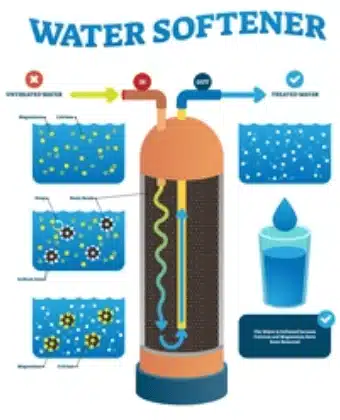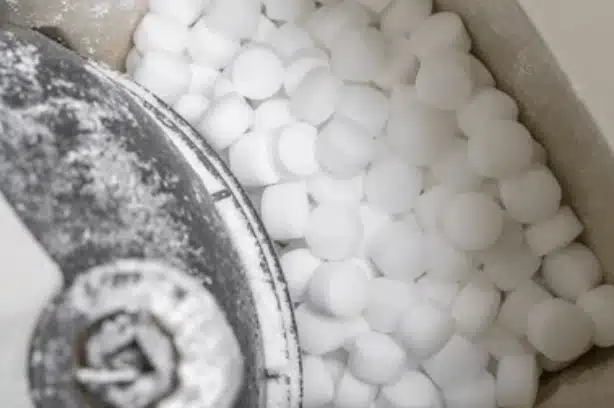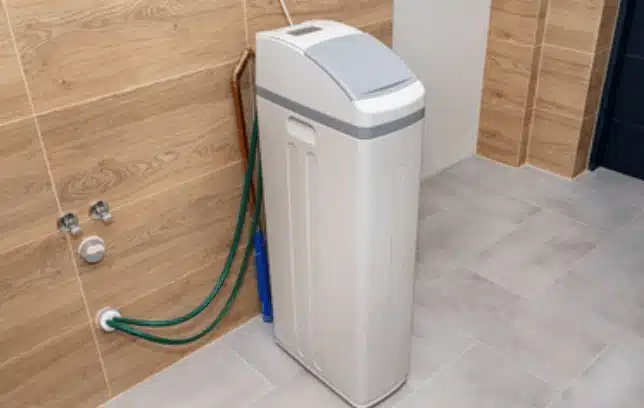Water softeners are an essential component in many households, especially those with hard water problems.
But have you ever wondered how exactly they work?
Water softeners have a unique method of tackling the issue of hard water, effectively removing the minerals that cause it.
In this article, we will delve into the science behind how does a water softener work and the benefits they offer.
A water softener is a device that is used to remove hardness from water.
Hard water is water that contains high levels of minerals, such as calcium and magnesium.
These minerals can cause various issues, such as:
limescale buildup
decreased soap
detergent effectiveness
damage to appliances and plumbing systems.
To overcome these problems, a water softener is necessary to soften the water and make it suitable for everyday use.
You should also know how does a water softener work properly.
A water softener works through a process called ion exchange.
Inside the water softener, there is a mineral tank filled with resin beads.
These beads are charged with sodium ions.
As the hard water passes through the mineral tank, the calcium and magnesium ions in the water are attracted to the resin beads.
The positively charged sodium ions on the beads are then exchanged with the calcium and magnesium ions.
Then they effectively remove the hardness from the water.
The softened water then exits the water softener and is ready for use.
This was about how does a water softener work

A water softener system is composed of several components, including:
The mineral tank is where the ion exchange process takes place, with the resin beads removing the hardness from the water.
The brine tank is responsible for holding the brine solution used in the regeneration process.
The control valve manages the regeneration cycle and controls the flow of water through the system.
Finally, the resin tank houses the resin beads and ensures that the water is properly softened.
The brine tank in a water softener plays a crucial role in the regeneration process.
During regeneration, the control valve directs water from the water supply into the brine tank.
Inside the brine tank, the water mixes with the water softener salt to create a brine solution.
This brine solution is highly concentrated with sodium ions.
When the brine solution is flushed through the mineral tank, it helps to regenerate the resin beads by replacing the calcium and magnesium ions.
These ions were trapped on the beads during the water softening process.
Water softeners play a crucial role in improving the quality of our water by reducing water hardness.
But have you ever wondered how they actually work?
One key aspect of a water softener’s operation is its regeneration process.
Water softener regeneration involves several important steps that help maintain the effectiveness of the system.
When hard water enters the mineral tank, it flows through a resin tank where an ion exchange process takes place.
This process removes the minerals present in the water, such as calcium and magnesium, and replaces them with sodium ions.
The treated water then exits the system, ready for use.
The regeneration cycle in a water softener refers to the process where the resin beads are cleaned and recharged with sodium ions.
After a certain volume of water has been treated, or when the hardness level reaches a certain point, the control valve initiates the regeneration cycle.
During this cycle, the control valve backwashes the mineral tank, flushing out any debris or sediment that may have accumulated.
Then, the brine solution is drawn from the brine tank and passed through the mineral tank to regenerate the resin beads.
Finally, the excess brine solution and any remaining hardness minerals are flushed out of the system.
This leaves the water softener ready for the next cycle.
The brine solution, which is created in the brine tank using water softener salt, plays a crucial role in regenerating the resin beads.
When the brine solution is flushed through the mineral tank, the highly concentrated sodium ions in the brine solution.
This helps replace the calcium and magnesium ions that were previously trapped on the resin beads.
This process restores the resin beads back to their original sodium-charged state.
Sodium ions play a vital role in water softener regeneration.
By exchanging places with the calcium and magnesium ions on the resin beads, sodium ions restore the beads’ ability to soften water.
During the regeneration cycle, the brine solution effectively replenishes the sodium ions on the resin beads.
This ensures that the water softener continues to function optimally.
Then it removes hardness from the water supply.
Are you tired of dealing with hard water and its effects on your home?
Hard water can cause a variety of issues, such as clogged pipes, mineral buildup, and dry skin and hair.
While many people opt to purchase a water softener to combat these problems, there are alternative options available.
These alternatives aim to treat the water through a process that removes the minerals from hard water, making it safe to drink and use.
One alternative is using a water conditioner, which does not require the use of salt or create salty water.
Another option is a water descaler, which uses electromagnetic fields to alter the structure of the minerals in the water.
This helps prevent them from causing damage.
If you’re looking for a solution that reduces the amount of water, a magnetic water softener may be the right choice for you.
By utilizing a magnetic field, it claims to soften the water passing through it without the need for added salt or chemicals.
Investing in one of these alternatives can ensure you have a reliable water supply without the drawbacks of a traditional salt-based water softener.
Salt-free water softeners, also known as water conditioners or descalers, are an alternative to traditional salt-based water softeners.
While they don’t remove hardness in the same way as salt-based softeners, they can still provide some benefits.
Salt-free water softeners use different methods, such as template-assisted crystallization or electromagnetic waves.
This helps change the structure of the hardness minerals in the water, making them less likely to cause issues like limescale buildup.
However, it’s important to note that salt-free water softeners may not be as effective in completely removing hardness from the water.
Using a salt-free water softener has its benefits and drawbacks.
One advantage is that salt-free systems don’t require the regular addition of salt, reducing maintenance and operating costs.
They also don’t produce wastewater during regeneration, making them more environmentally friendly.
However, salt-free water softeners may not be as effective in areas with extremely hard water.
They may not provide the same level of softness as a traditional salt-based water softener.
Additionally, some people prefer the taste of softened water produced by salt-based softeners.
There are other methods to make water safe to drink without using a water softener.
Some common methods include:
These methods can help remove various contaminants, such as chemicals, bacteria, and heavy metals, from the water.
They help make water safe for consumption.
However, it’s important to note that these methods may not address the issue of hardness in water.
If you’re specifically looking to reduce hardness, a water softener is still the most effective solution.
Are you struggling with common water quality problems caused by hard water?
If so, it may be time to consider purchasing a water softener and know how does a water softener work.
Hard water can cause issues such as dry skin, dull hair, and mineral buildup in your pipes.
With the right water softener, you can enjoy a water supply line that is safe to drink and free from the minerals.
When selecting a water softener system, several factors should be considered.
First, you need to determine the size of the system based on your household’s water usage and the hardness level of your water.
The flow rate of the water softener should also be considered to ensure that it can meet the demands of your household.
It’s essential to choose a reputable brand and ensure that the system has the necessary certifications and warranties.
Lastly, consider the installation requirements and the availability of professional support for maintenance and repairs.
The water flow rate is a crucial factor that affects the efficiency of a water softener.
If the flow rate exceeds the capacity of the water softener, it may not be able to effectively remove hardness from the water.
This can lead to reduced efficiency and a lower quality of treated water.
It’s important to choose a water softener system that is appropriately sized for your household’s water usage.
This helps ensure optimal performance and maximum softening capacity.
Having a separate water softener for the water heater is not always necessary, but it can be beneficial in certain situations.
Water heaters are particularly susceptible to the negative effects of hard water, such as limescale buildup.
By installing a water softener specifically for the water heater, you can:
However, if your main water softener is already effectively treating the water, a separate softener for the water heater may not be necessary.
Are you struggling with hard water in your home?
Hard water can cause a variety of problems, from mineral buildup on fixtures to dry skin and dull hair.
One effective solution is to purchase a water softener, which removes the minerals from hard water.
This makes the water safe to drink and use.
A water softener should be flushed periodically to prevent the accumulation of debris and sediment in the system.
The frequency of flushing depends on various factors, such as the hardness level of the water and the manufacturer’s recommendations.
As a general guideline, it’s recommended to flush the system every 4 to 6 weeks.
However, it’s essential to consult the specific instructions provided by the manufacturer to determine the appropriate flushing schedule for your water softener.
Several signs indicate the need for regeneration in a water softener.
One common sign is the re-appearance of hardness symptoms, such as limescale buildup or soap scum in sinks and showers.
Another indication is a decrease in the effectiveness of soap

Water softener salt is an essential component of water softening systems.
It works by removing the minerals that cause water hardness, allowing for better water quality.
Water softener salt comes in various forms, including pellets, crystals, and blocks.
It is important to regularly replenish the salt in the system to ensure its effectiveness in treating hard water.
Overall, water softener salt plays a crucial role in improving the efficiency and lifespan of water softeners.
Al Rooter Plumbing company offers water softener installation services in Houston and the surrounding areas
Call us at (832) 434-5936: Call us at our hotline and our customer service team will be ready to take your call.
Visit our website and fill out the contact form: Visit our website Al Rooter Plumbing Company and fill out the contact form with your information and plumbing issue.
Email us at alrooterplumbingllc@gmail.com: You can also send us an email with your plumbing issue and we’ll get back to you as soon as possible.
| M | T | W | T | F | S | S |
|---|---|---|---|---|---|---|
| 1 | 2 | 3 | 4 | 5 | ||
| 6 | 7 | 8 | 9 | 10 | 11 | 12 |
| 13 | 14 | 15 | 16 | 17 | 18 | 19 |
| 20 | 21 | 22 | 23 | 24 | 25 | 26 |
| 27 | 28 | 29 | 30 | 31 | ||

